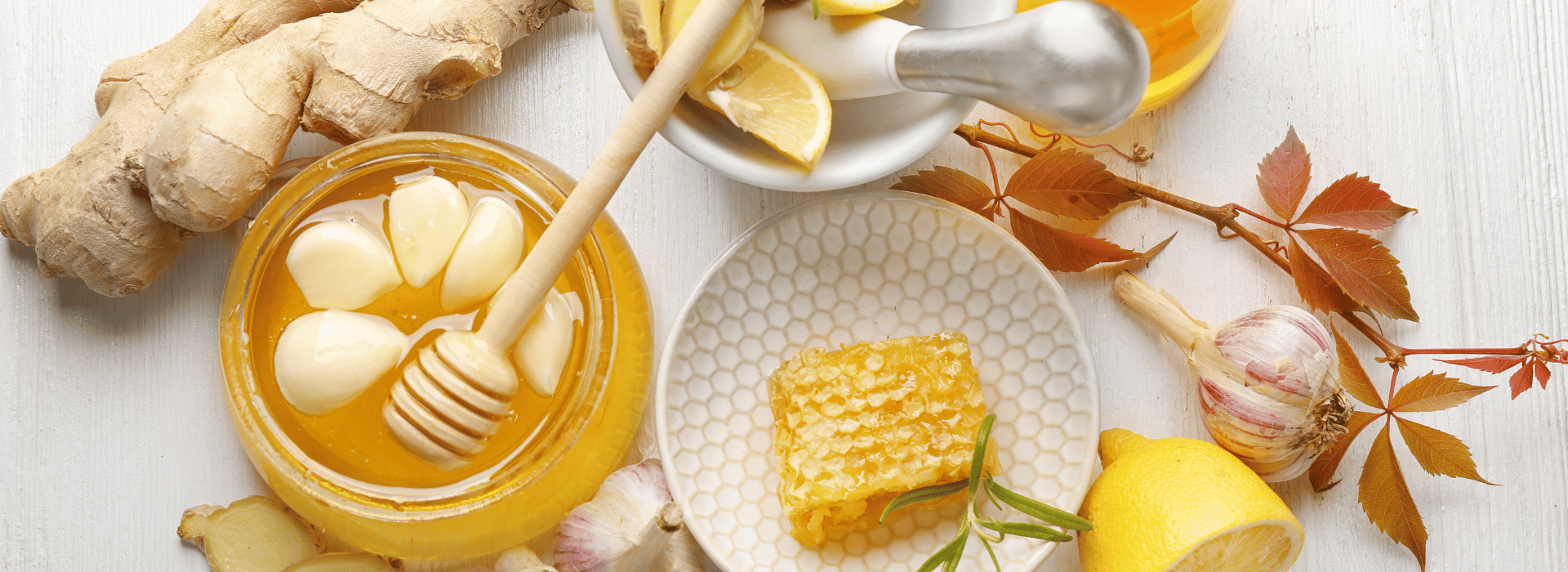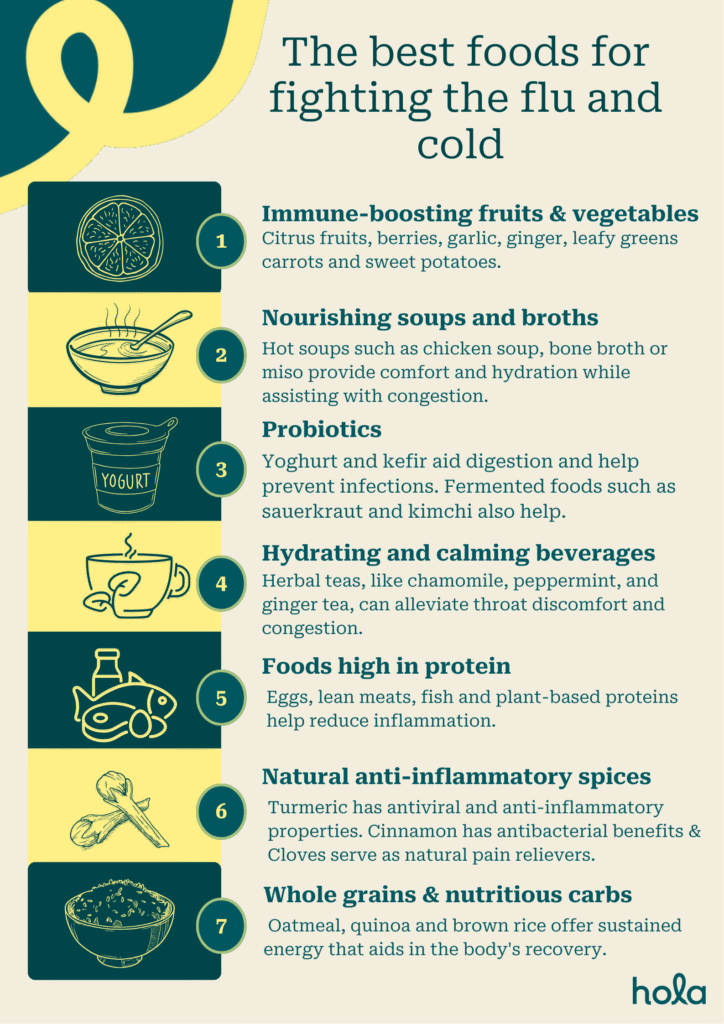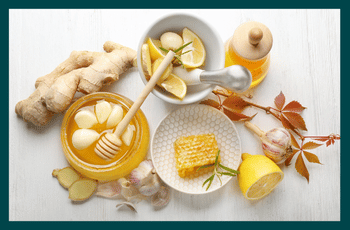Cold and flu: What to eat and drink, what to avoid
Written by the editorial staff writer at Hola. Medically Reviewed by Dr. Ammar AL-ANI, MBChB, CCBST, AMC.

Contents

The best foods for fighting the flu and cold
While battling the flu or a cold, your body needs the right nutrients to boost immunity, reduce inflammation, and speed up recovery. Here are some of the best foods to help fight off the flu and cold:Immune-boosting fruits and vegetables:
Consuming fruits and vegetables high in vitamins and antioxidants can boost your immune system. Citrus fruits, such as oranges, lemons, and grapefruits, are excellent sources of vitamin C, which aids in combating infections. Berries like strawberries and blueberries are rich in antioxidants that facilitate recovery. Garlic possesses strong antibacterial and antiviral capabilities, whereas ginger helps reduce inflammation and alleviates sore throats. Leafy greens such as spinach and kale offer vital nutrients needed for immune support. Carrots and sweet potatoes are abundant in beta-carotene, which fortifies the body's defences against illness.Nourishing soups and broths:
Hot soups provide comfort and hydration while assisting with congestion. Chicken soup is a traditional remedy containing amino acids like cysteine, which help clear mucus. Bone broth is rich in minerals and collagen, which play a vital role in healing. Miso soup, made from fermented soybeans, is rich in probiotics that enhance gut health and immunity.Probiotics:
Probiotics are essential for maintaining a healthy gut, which is important for a robust immune system. Yoghurt and kefir are packed with live cultures that aid digestion and help prevent infections. Fermented foods such as sauerkraut and kimchi also offer probiotics that strengthen the body’s defences against colds and flu.Hydrating and calming beverages:
Consuming ample fluids helps eliminate toxins and maintains throat moisture. Herbal teas, like chamomile, peppermint, and ginger tea, can alleviate throat discomfort and congestion. Honey and lemon water offer antibacterial properties while soothing irritation. Warm turmeric milk has anti-inflammatory effects that can ease flu symptoms. Coconut water helps replenish electrolytes, particularly during a feverFoods high in protein:
Proteins are vital for tissue repair and immune function. Eggs are an excellent source of zinc and selenium, which are crucial for fighting infections. Lean meats and fish supply protein and omega-3 fatty acids that help reduce inflammation. Plant-based proteins can be found in legumes and nuts such as lentils, almonds, and walnuts.Natural anti-inflammatory spices:
Certain spices possess healing qualities that can relieve symptoms. Turmeric contains curcumin, which has antiviral and anti-inflammatory properties. Cinnamon can help ease congestion and has antibacterial benefits. Cloves serve as natural pain relievers and can be beneficial for sore throats.Whole grains and nutritious carbohydrates:
Whole grains deliver energy and essential nutrients. Oatmeal is gentle on the stomach and high in fibre, promoting healthy digestion. Quinoa and brown rice offer sustained energy that aids in the body's recovery.
Foods to avoid when you have the flu and cold
Avoiding certain foods can help speed up recovery and prevent worsening flu and cold symptoms:- Sugary foods and beverages: Sugar can undermine the immune system and increase inflammation, making it more difficult for your body to fend off infections. It is advisable to avoid sodas, candies, desserts, and even fruit juices with added sugars. Excessive sugar consumption can also lead to energy drops, causing you to feel more fatigued.
- Dairy products (for select individuals): While dairy items like milk and cheese are nutritious, they might thicken mucus in some individuals, exacerbating congestion and making breathing more difficult. If you observe increased mucus after consuming dairy, it may be wise to limit its intake until recovery. Probiotic-rich yoghurt is an exception because it helps improve gut health and boosts immune function.
- Processed and fried foods: Highly processed items such as chips, fast food, and prepackaged snacks contain unhealthy fats and artificial ingredients that can heighten inflammation and impede recovery. Fried foods are also tough to digest and can leave you feeling lethargic when your body requires energy to restore itself.
- Caffeinated drinks: Beverages like coffee, energy drinks, and strong black tea may contribute to dehydration, which is counterproductive when battling a cold or flu. Caffeine can also disrupt sleep, which is vital for recovery. If you crave a warm drink, choose herbal teas instead.
- Alcohol: Alcohol can lead to dehydration. It may also disrupt sleep, which is essential for a swift recovery. It’s advisable to refrain from consuming alcoholic beverages until you feel better.
- Spicy foods (if you have a sore throat or stomach issues): Spicy foods, such as chilli peppers and hot sauces, may help relieve congestion; however, they can also irritate a sore throat or cause stomach discomfort. When your throat is inflamed or you feel nauseous, it's advisable to opt for soothing foods instead.
- Acidic foods: Foods high in acidity, such as tomatoes, citrus fruits, and vinegar-based products, can be harsh on a sore throat and irritate. While citrus fruits offer a good source of vitamin C, too much of them can cause discomfort.
- Hard or crunchy foods: Chips, crackers, and toast can be abrasive on a sore throat, increasing pain levels. Softer, easier-to-swallow options like soups, mashed potatoes, and smoothies are more suitable.
Also read: How To Get Rid of the Flu?
What to drink to stay hydrated
Ensuring proper hydration is vital for recovery and overall health. Here are some of the top beverages to help you stay hydrated:- Water: Regular water is the most effective way to maintain hydration. If you find it uninteresting, consider adding a slice of lemon, cucumber, or mint for a refreshing flavour.
- Herbal teas: Caffeine-free herbal teas such as chamomile, peppermint, ginger, and lemon can help soothe a sore throat, alleviate congestion, and encourage relaxation.
- Coconut water: Packed with electrolytes like potassium and magnesium, coconut water aids in replenishing fluids lost due to fever or sweating.
- Warm broths: Chicken or vegetable broth offers hydration, vital minerals, and amino acids that promote recovery.
- Honey and lemon water: A warm blend of honey and lemon in water can soothe the throat, deliver vitamin C, and possess antibacterial properties.
- Warm turmeric milk: Milk combined with a little turmeric boasts anti-inflammatory benefits that can assist with flu symptoms. Choose non-dairy milk if dairy increases mucus for you.
- Diluted fruit juices: Fresh, unsweetened juices like orange or pomegranate are rich in vitamins. However, diluting them with water is a good idea to avoid consuming too much sugar.
- Electrolyte drinks: Whether homemade or store-bought, electrolyte beverages help replenish lost minerals due to significant sweating and fever. Steer clear of sugary sports drinks and choose natural options instead.
- Ice chips or popsicles: If you're experiencing a sore throat or difficulty consuming fluids, sucking on ice chips or homemade frozen fruit popsicles can aid in keeping you hydrated.
Also read: Preparing for influenza: A doctor's recommended home care kit - Hola Health
Eating right year-round to prevent the flu: Immune-boosting foods
Maintaining a well-rounded diet that includes immune-boosting foods can enhance your body's defences and help lower the risk of flu and other infections throughout the year.
- Vitamin C-rich foods: Vitamin C is crucial for a robust immune system. Incorporate citrus fruits such as oranges, lemons, and grapefruits alongside strawberries, kiwis, bell peppers, and broccoli to strengthen your natural defences.
- Foods high in vitamin D: Vitamin D is essential for proper immune function. Good sources of key nutrients are fatty fish such as salmon and mackerel, eggs, fortified dairy and plant-based milk. Spending time outdoors also enables your body to generate vitamin D.
- Zinc-packed foods: Zinc plays a key role in fighting viruses and infections. Include foods rich in zinc, such as nuts, seeds, beans, lentils, chickpeas, shellfish, and lean meats in your diet.
- Antioxidant-rich fruits and vegetables: Brightly coloured fruits and vegetables, including carrots, sweet potatoes, spinach, kale, and blueberries, are filled with antioxidants that safeguard cells and minimise inflammation.
- Healthy fats: Omega-3 fatty acids in foods such as walnuts, flaxseeds, chia seeds, and fatty fish help reduce inflammation and bolster overall immunity.
- Garlic and ginger: Garlic has inherent antibacterial and antiviral qualities, while ginger aids in reducing inflammation and fighting infections. Regularly including these in your meals can boost immune function.
- Hydration for immune health: Sufficient fluid intake assists your body in eliminating toxins and functioning effectively. Staying hydrated is crucial for illness prevention.
- Spices with healing properties: Turmeric, cinnamon, and cloves contain compounds that combat inflammation and bolster immunity. Adding these to your meals or drinks can offer additional protection.
Other tips
To avoid the flu throughout the year, focus on maintaining a healthy lifestyle, including:
- Aim for 7 to 9 hours of sleep
- Engage in regular physical activity
- Manage stress using relaxation methods
- Practice good hygiene by washing your hands often and refraining from touching your face
- Consume a diet rich in nutrients that includes immune-enhancing foods, ensure adequate hydration
- Seek fresh air and sunlight for vitamin D
- Steer clear of smoking, excessive alcohol consumption, and processed foods, as they can compromise your immune system
- Keep your living space tidy by frequently disinfecting common surfaces
- Stay current on flu vaccinations
- Heed your body’s signals—resting and hydrating at the first hint of illness may help prevent it from escalating.
When to consult a doctor
Consult a doctor if flu symptoms worsen or do not improve within 7 to 10 days. Seek urgent medical care if you experience a high fever (over 102°F or 39°C), trouble breathing, chest pain, continuous dizziness, confusion, severe muscle pain, or when lips or face turn bluish. When dealing with young children, watch out for signs such as trouble breathing, a refusal to drink fluids, excessive irritability, or unusual lethargy. For older adults, pregnant women, or individuals with chronic illnesses (such as diabetes, asthma, or heart disease), flu-related complications can be more severe. If symptoms reoccur after initial improvement, it could signify a secondary infection like pneumonia. Prompt medical attention can help avert complications and hasten recovery.
How can telehealth help?
Telehealth consults allow people to consult with medical professionals regarding flu and cold symptoms from the comfort of their homes. Hola Health's telehealth platform provides a convenient and dependable way to manage flu-related issues. Our services are available around the clock and include:
- Telehealth consultations in Australia: Individuals can connect with knowledgeable medical professionals to discuss symptoms such as fever, cough, and congestion. The online doctor will evaluate the situation and offer expert advice for treatment and recovery.
- Immediate online prescriptions: Healthcare providers can send prescriptions electronically if a patient needs medication. Patients can collect them from local pharmacies or choose same-day delivery through online pharmacy services.
- Doctor referrals: For severe flu symptoms or complications, doctors can recommend patients for diagnostic tests or specialist appointments, such as pulmonologists for respiratory concerns.
- Dr certificates: If flu symptoms necessitate time away from work or school, Hola Health's telehealth service can issue same-day or multi-day medical certificates tailored to individual needs.
FAQs
Is the BRAT diet right for the flu?
The BRAT diet (Bananas, Rice, Applesauce, and Toast) is often suggested for digestive problems like diarrhoea and nausea, but it may lack adequate nutrition for flu recovery. Although these foods are easy to digest and ease nausea, a more balanced diet that includes protein, healthy fats, and vitamins is preferable for overall healing. Consider incorporating broth, lean protein, and hydrating fluids for a comprehensive recovery.
Foods to eat when nauseous
When experiencing nausea, choose bland, easy-to-digest foods such as crackers, dry toast, bananas, applesauce, and rice. Clear broths, herbal teas, and electrolyte beverages can help prevent dehydration. Foods infused with ginger, such as ginger tea or candies, can help calm the stomach. Avoid spicy, greasy, or pungent foods as they aggravate nausea.
Does not eating make the flu worse?
Not eating can slow your recovery because your body needs nutrients to fight infections. It's normal to experience a loss of appetite, but aim to eat small, nutritious meals. Options like soups, smoothies, and snacks high in protein can be particularly beneficial. Staying properly hydrated is also crucial. If solid foods are challenging to consume, focus on broths, teas, and drinks rich in electrolytes to maintain energy.
Can a healthy diet prevent me from getting sick?
A healthy diet promotes a robust immune system, helping to diminish the likelihood of infections. Consuming vitamin-packed foods (like citrus fruits and leafy greens), sources of protein (such as eggs and legumes), and probiotic-rich foods (like yoghurt and kimchi) assists in preserving immunity. A healthy diet is important, but it isn't enough to prevent illness. To maintain good health, it's also crucial to practice good hygiene, exercise regularly, get adequate sleep, and stay up to date with vaccinations.
When you are feeling under the weather, give your body the best opportunity to recover by choosing the right foods and drinks. Stay hydrated, pick options packed with nutrients, and avoid anything that could slow down your healing. Listen to your body, rest, and soon you will be back on track!
What we treat
- Cough
- Nausea & vomiting
- Fever
- Hayfever
- Fatigue
- Sore throat
- Acne
- Hair loss
- Gout
- Eczema
- Rosacea
- Sunburn
- UTI
- Erectile dysfunction
- Contraception
- Morning sickness
- Morning after pill
- Prostate health
- Anxiety
- Depression
- Stress
- Grief & loss
- Antidepressants
- Premature ejaculation
- Asthma
- Blood pressure
- Blood thinners
- Diabetes
- Cholesterol
- Migraines & headaches
- Allergies
- Body ache
- Heartburn & reflux
- Sleep disorder
- Pain relief
- Gastro
Related Articles
Disclaimer
This blog is for general informational purposes only and does not indicate that Hola Health provides all treatments or preventive measures mentioned. It is not intended to be a substitute for professional medical advice. Always seek the guidance of your doctor or other qualified health professional with any questions you may have regarding your health or a medical condition. For emergencies please immediately contact 000. Any medical topics discussed are intended to educate, not to imply availability through Hola Health.

Get affordable healthcare on your terms, with quick access to qualified, Australian-registered telehealth doctors & health practitioners, 24/7, 365 days a year. No more searching for ‘doctors near me‘ – Hola connects you instantly.
Address: 79 St Georges Terrace, Perth WA 6000


Hola Health App
Get affordable healthcare on your terms, with quick access to qualified, Australian-registered telehealth doctors & health practitioners, 24/7, 365 days a year. No more searching for ‘doctors near me‘ – Hola connects you instantly.
Call 000 for emergency or urgent medical help.
Address: 79 St Georges Terrace, Perth WA 6000
© Hola Health, a brand of Packapill Pvt Ltd


 Facebook
Facebook  X
X  Copy Link
Copy Link











